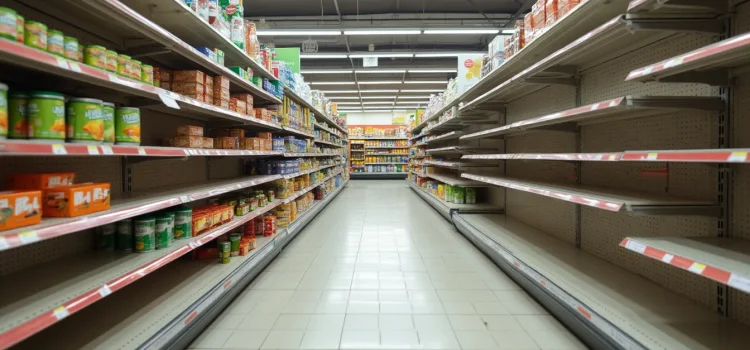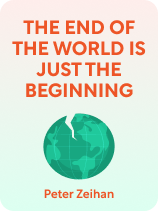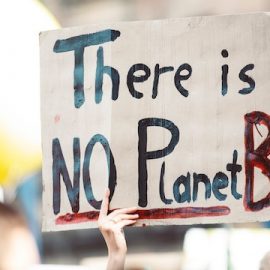

This article is an excerpt from the Shortform book guide to "The End of the World Is Just the Beginning" by Peter Zeihan. Shortform has the world's best summaries and analyses of books you should be reading.
Like this article? Sign up for a free trial here.
Is a global food crisis on the horizon? Could predictions about widespread famine become a reality?
According to Peter Zeihan, famine might be on the road ahead. In The End of the World Is Just the Beginning, he explores the potential consequences of globalization’s decline on food security. He warns of a looming global food crisis, highlighting the vulnerabilities in our current food production and distribution systems.
Read on to discover Zeihan’s insights into the future of the global food supply and the challenges we might face in feeding the world’s population.
Peter Zeihan Predicts a Global Food Crisis
According to Peter Zeihan, famine might be in our future. He says that the most serious threat from globalization’s downfall is that people won’t have enough food. The reason for the shortage will be simple—billions of people live thousands of miles from where their food is produced. Feeding them depends on cheap, reliable shipping, and, if that fails, so does the food supply. Densely populated cities depend almost entirely on imported food, and if trade breaks down, they can’t feed themselves.
One solution to a global food crisis might be to move people back to the countryside to work on farms, but many places in the world can’t support enough agriculture to sustain their current population. Therefore, Zeihan predicts that breakdowns in food production will lead to mass starvation, death, and the fall of governments.
(Shortform note: Contrary to Zeihan’s assertions about the weaknesses of sourcing food through trade, others argue that our globalized food system increases countries’ resilience to agricultural disruptions. International trade in agriculture acts as a backstop against local breakdowns in food production, such as climate disasters that kill crops in some regions. Those areas will feel an economic impact, but global supply lines prevent total food shortages. The food network is also redundant—no food is produced in only one place, so no sector of the world’s food industry will be impacted at the same time. As long as food transportation remains unaffected—which Zeihan strongly questions—the overall system may hold firm.)
However, disruptions to international commerce won’t just stop food from being shipped—farm equipment manufacturers won’t be able to get their machinery to the countries that need it, and if farmers can’t purchase equipment and keep it in working order, they can’t produce food in the first place, with or without a means to ship it. Additionally, Zeihan points out that the technology doesn’t exist to run heavy-duty farm equipment on anything but oil, which—as we’ve already discussed—will also be in short supply. Moreover, oil is a key ingredient in the pesticides that industrial farms use to keep their crops insect-free.
(Shortform note: Shortages in farm equipment haven’t materialized as of this writing, but the cost of equipment is still a barrier in the developing world. Therefore, farmers in some countries are finding innovative ways to access equipment. For example, farmers in the Caribbean use a digital platform to connect them with tractor owners—sharing equipment in a way resembling ride sharing platforms like Uber or Lyft. In India and Africa, farmers make use of pay-per-use models or rental agreements, bundling services across their local agricultural networks. Sharing agricultural equipment through these models helps reduce cost, strengthens ties within communities, and acts as a safety net if new farm equipment becomes hard to import.)
On top of all this, there’s climate change to deal with. Zeihan writes that with changing climate patterns, regions with abundant water and sunlight will become even more productive than before, but dry regions will become even drier, killing any hope of turning them into farmland. In some regions, climate change will alter rainfall patterns, such as by reducing the impact of monsoons that India and Southeast Asia depend on. In places where rainfall increases, frequent flooding will become a problem. The farmlands of the American Midwest may benefit from climate change and increase their yield, but overall, Zeihan says that the regions that increase their food production won’t offset the loss of arable farmland elsewhere in the world.
(Shortform note: Though Zeihan suggests that some farming regions will benefit from climate change, current statistics show that the amount of usable farmland in the world is shrinking. Even the US has been losing almost two million acres of farmland per year to housing development, industrial pollution, and erosion due to weather. Even though demand for more farmland is increasing, so are the pressures for other ways to use it, such as for producing renewable energy. Since farmland is acquired by converting natural ecosystems for human use, there are also those who argue against expanding it further in the interest of environmental concerns—particularly to restore ecosystems that capture the carbon we emit into the air.)
Feeding the World to Come
Sadly, manufacturing and economic worries may pale in comparison to the main danger that the end of globalization represents—that there might not be enough food to go around. Zeihan explores some options countries might take to secure enough food, though some of them aren’t pleasant, such as ceding control to wealthier nations or taking a giant leap back to the days of agrarian, subsistence farming.
As international trade unravels, how well countries can feed their people will determine how much chaos and human misery they’ll experience. According to Zeihan, only a handful of countries are capable of being completely self-supporting. Those that can’t grow the food they need will either go hungry or risk becoming vassals to any agricultural superpower that’s able and willing to feed them. No matter what, too many populations have grown beyond what local agriculture can support, and in the worst-case scenario, billions of people will face famine and starvation. There’s hope in new technologies, including AI-based crop management, but Zeihan thinks it’s unlikely that massive agricultural breakthroughs will happen soon enough.
(Shortform note: The World Bank reports that even without a breakdown in food transportation, there’s a steady decrease in the availability of food in many countries, driven largely by steep inflation in food prices overall. The World Bank’s response targets financial aid and policy reform to make trade even easier and more affordable for food producers and distributors in struggling areas. Meanwhile, research into food self-sufficiency has focused on determining which countries are most able to meet their own food production needs, though even in countries such as the US that could be self-sufficient, there are regions in which hunger is endemic.)
Another option we mentioned earlier is to force people out of their cities and back to working on farms. Zeihan writes that the days of specialized agriculture will end, since countries will have to go back to the basic staples they need to feed their own people. While this may help some countries survive, they’ll be much poorer than they are today because they won’t be growing the cash crops that are profitable under globalization. Wealthier countries will feel the pinch in the form of fewer options in grocery stores, but for poor countries, the result will be a rollback to subsistence farming.
(Shortform note: While Zeihan’s outlook may come across as defeatist, not everyone believes worldwide famine is inevitable. In Apocalypse Never, Shellenberger agrees that small, local farms will never support the world’s current population levels, but he’s optimistic that bringing industrial farming techniques to the developing world will allow struggling countries to produce more food on less land. These practices would also curtail deforestation, which is currently practiced to create more land for less efficient farming practices.)

———End of Preview———
Like what you just read? Read the rest of the world's best book summary and analysis of Peter Zeihan's "The End of the World Is Just the Beginning" at Shortform.
Here's what you'll find in our full The End of the World Is Just the Beginning summary:
- Why the golden age of international trade is about to end
- Why the collapse of international trade is the biggest threat to civilization
- How to prepare for tumultuous decades to come






